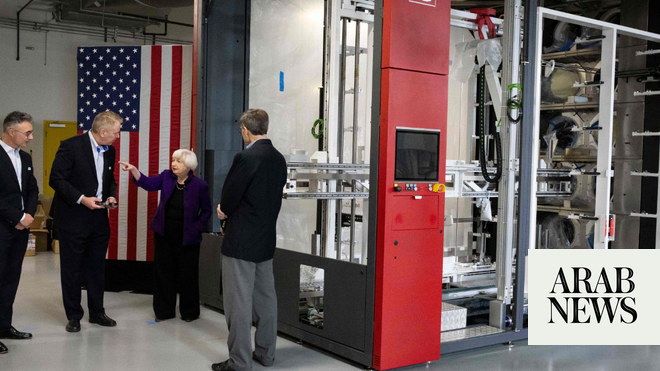
The latest round of imports will face 10 percent tariffs through the end of the year, and then the rate will jump to 25 percent
Trump warned that “if China takes retaliatory action against our farmers or other industries, we will immediately pursue phase three, which is tariffs on approximately $267 billion of additional imports
WASHINGTON: US President Donald Trump on Monday defied warnings and escalated the trade confrontation with China, hitting the country with tariffs starting next week on another $200 billion in imports and threatening to target even more if Beijing retaliates.
Trump said China had refused to change the unfair practices that hurt US businesses and workers.
“For months, we have urged China to change these unfair practices and give fair and reciprocal treatment to American companies,” Trump said in a statement.
“These practices plainly constitute a grave threat to the long-term health and prosperity of the United States economy,” he said.
“But, so far, China has been unwilling to change its practices,” including theft and force transfer of technology.
Once the new round of tariffs takes effect on September 24, punitive duties will be in place on roughly half of the products the US buys from China — its largest source of imported merchandise.
The latest round of imports will face 10 percent tariffs through the end of the year, and then the rate will jump to 25 percent.
In Beijing, China’s Foreign Ministry had already vowed to strike back.
“If the US launches any new tariff measures, China will have to take countermeasures to firmly ensure our legitimate rights and interests,” foreign ministry spokesman Geng Shuang told reporters during a regular press briefing on Monday.
But Trump warned that “if China takes retaliatory action against our farmers or other industries, we will immediately pursue phase three, which is tariffs on approximately $267 billion of additional imports.”
That would mean imposing new taxes on all of the goods the US imports from China.
“Once again, I urge China’s leaders to take swift action to end their country’s unfair trade practices,” Trump said. “Hopefully, this trade situation will be resolved, in the end, by myself and President Xi of China, for whom I have great respect and affection.”
The new taxes will hit a broad swath of products, including billions in Chinese-made voice data receivers, computer memory modules, automatic data processors, and accessories for office equipment such as copiers and bank note dispensers — instantly making widely used goods more expensive.
However, senior administration officials told reporters the initial list announced in July was reduced by 300 product lines after the administration received 6,000 written comments from consumers and businesses.
The products spared included consumer electronics like smart watches and Bluetooth devices, child safety products such as high chairs, car seats and play pens, and certain health-and-safety products such as bicycle helmets, the officials said.
The officials said China had been given “chance after chance” to change the trade practices considered unfair to US businesses, but “have remained obdurate.”
Only last week, Beijing said it welcomed overtures from US officials offering to re-start trade talks, but press reports indicate China would call off any meetings if the new punitive duties take effect.
The escalating confrontation shook up global stock markets. Wall Street closed the day solidly in the red, and word of the fresh round of tariffs had already sent Chinese stocks tumbling more than one percent, with the benchmark Shanghai Composite Index falling to 2,651.79, the lowest level since 2014.
While officials said the impact on the US economy has been minimal, firms across the country report lost businesses, layoffs and possible bankruptcies as input costs rise and exports fall.
They officials told reporters the lower initial tariff rate would give US businesses time to find new suppliers.
That could soften the blow to US consumers and manufacturers among others ahead of key US congressional elections in November.
Lobbying against the tariffs has risen sharply in Washington but Trump’s policy has left candidates in competitive races for November’s hard-fought midterm congressional elections in awkward positions.
Some Republicans in export-dependent areas have fallen silent on trade or sought to push back. But some Democrats, who broadly oppose the president’s agenda and are banking on his unpopularity, have adopted critical views of trade agreements and free trade.












